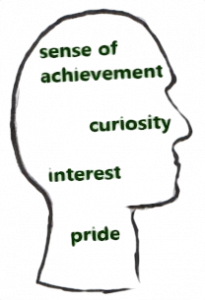To succeed as a disruptive digital business, you’re going to need to cultivate some team behaviours and personal qualities that might not have seemed so important in the past.
I believe these four Cs are the key attributes you need in your organisation if you want to be the disruptor and not the disrupted.
Curious people are not satisfied by the things they already know about and understand — they know there is so much they don’t know yet, and so much to learn.
Curious people help to disrupt the market by uncovering new knowledge and ideas, and changing everything in the process.
Curiosity is the spark that triggers innovation.
Creative people take the things they know and relate them to find patterns. They extrapolated new ideas, they try things, they make suggestions out of left field.
Creative people aren’t shackled to old ways of doing things. They are always looking to find better ways.
Creative people don’t say “no”, they say “give me time and I’ll find a way”. If you want to disrupt rather than be disrupted, you need creative people.
Collaboration fosters openness and trust, which underpins positive team culture.
Collaboration allows us to work more efficiently by breaking down silos and promoting a common vision and shared goals.
Collaboration allows you to leverage the different strengths of everyone in your team by allowing everyone’s ideas to be heard and by promoting discussion.
Culture-focussed organisations know the old command and control style of management has become increasingly counter-productive. The problems we’re solving are too complex for the simplistic management ideas of the past.
Culture drives performance. Poor culture kills curiosity, creativity and collaboration, leading to lower quality and staff engagement. Good culture promotes and maximises the other 3 Cs and is key to attracting and retaining talent.
Culture-focussed leaders know future success lies in creating an environment within which curious and creative people can collaborate and succeed.
In Conclusion
Digital businesses need openness and agility to achieve their goals.
Curiosity, creativity, collaboration and culture are essential to creating organisations that move fast, work efficiently and are not prone to getting stuck in the past.
What do you think?




